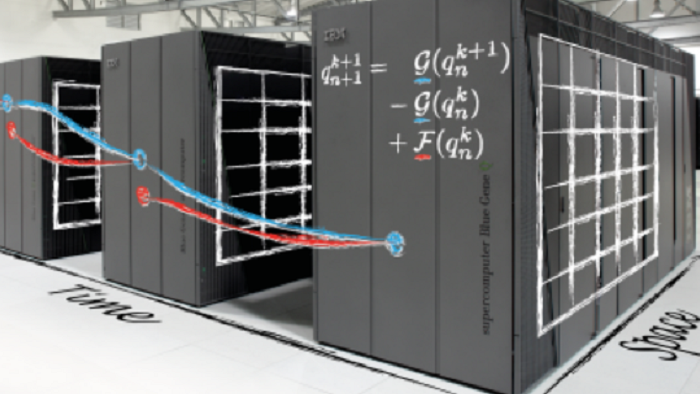New time integration methods: parallel-in-time ...
Since about a decade ago the scientific computing community has been confronted with physical limitations of the CPU/GPU manufacturing process. As a result, the main increase in performance is not driven anymore by the increase in clock frequency, but by an increase in parallelism. This poses a particular challenge for simulations that have to be finished within a certain wall clock time with ongoing expectations on using higher resolutions for higher accuracy. This requires disruptive approaches to cope with such situations, and this compact course gave an introduction to time integration methods which are one of the most promising ways out of this situation.
The first day of the course began with a crash course on advanced time integration techniques for ordinary differential equations (ODE) and their extension to partial differential equations (PDE). This was followed by an introduction to the Parareal method for ODEs. Parareal belongs to the class of parallel-in-time methods with the underlying idea of first calculating a speculative solution which is successively corrected in parallel over the speculative solutions, i.e. parallel in time, in order to exploit additional degrees of freedom for parallelization on large supercomputers.
On the second day a very short introduction to the methods of space discretization (finite differences and different types of Galerkin methods such as global/local spectral methods) and their relation to time integration methods was discussed. This plays a crucial role in the development of PDE solvers, which are often ignored in such a development. This created the basis for the continuation of the Parareal method for PDEs.
The third and fourth day extended the previously acquired knowledge and understanding by exponential integration and its rational approximations. This was followed by spectral deferred correction (SDC) methods and their extension to multilevel SDC (ML-SDC). Finally, the students gained insight into the ideas of the Parallel Full Approximation Scheme in Space and Time (PFASST), which completed this course.
Overall, the students gained insight into the challenges of time integration and nextgeneration time integration methods, in particular parallel in time, and understood the interplay of time and space discretization schemes.
Text:
Dr. Martin Schreiber, Elite Graduate Program "Bavarian Graduate School of Computational Engineering"


